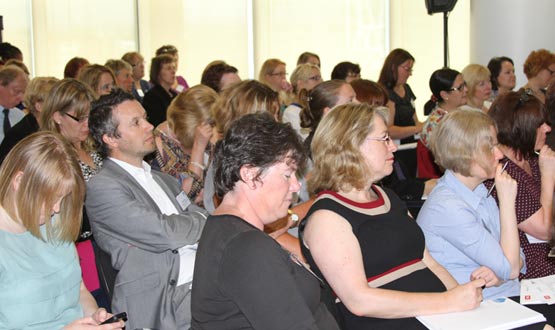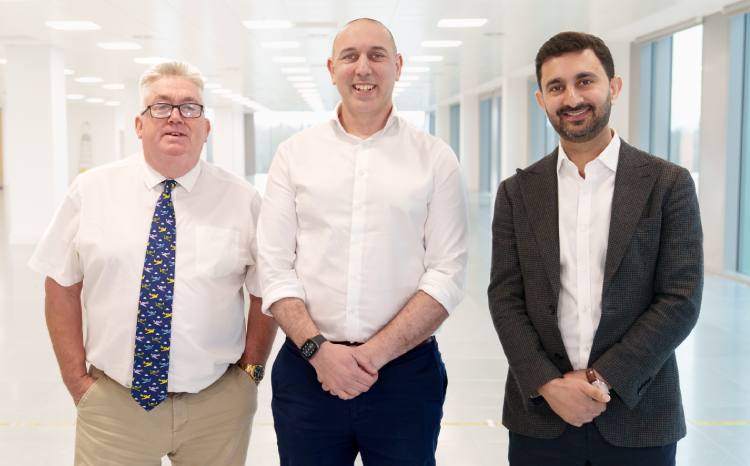CCIO Leaders Network: Nursing change
- 26 July 2012

Ask Fiona Stephens why she took up the role of chief clinical information officer at Medway Community Healthcare and you get a revealing answer. “I partially wanted to prove that nurses aren’t slow to adopt and innovate,” she says.
Her response acknowledges that nurses are often considered resistant to new technologies and new information sources.
If the strongly attended Celebrating Leadership in Nursing Informatics event is any indication, however, that state of affairs is one that is rapidly changing.
Surveying a packed room at Cerner’s London headquarters, Dr Susan Hamer – director of nursing, midwifery and allied health professionals at NHS Connecting for Health – declared herself delighted by the level of interest.
Getting nursing to the table
“Two years ago, we would barely have had enough people to fill a table,” she said.
“The fact that we have 100 middle-to-senior grade nurses here is a sign of how far things have moved forward.”
An encouraging video message from Jane Cummings, England’s newly appointed chief nursing officer, seemed to underscore the extent of the shift.
The conference was the latest partner event run by the EHI CCIO Leaders Network, established to develop clinical information leadership across the NHS.
EHI’s editor, Jon Hoeksma, explained that this event had particular significance because “nursing was one of the main groups we were trying to reach when we put the network together.”
The timing was significant too, coming just a few weeks after the publication of the Department of Health’s long-awaited NHS information strategy.
‘The Power of Information’ has provoked intense focus on transparency in the NHS, with much debate on how data can be used to improve healthcare.
Many speakers argued that this focus is not going to be a fleeting one – clinicians will soon have no choice but to be open with information.
Getting it right could lead to increased productivity, better care, and more informed patients. Get it wrong and the consequences could be serious.
Clear need for transparency
“There is no way the NHS will meet its fiscal challenges without being much more open,” contended Dr Mark Davies, executive medical director of the NHS Information Centre.
“Transparency isn’t something which is just a nice idea, a political trend. It’s something which is absolutely fundamental to the survival of the NHS.”
Negative memories of the National Programme for IT in the NHS are fresh in the minds of many – learning disability practitioner Sue Medley characterised IT as having often been “something done to clinicians rather than something we do."
However, speakers were keen to emphasise that power lies in the hands of individual healthcare professionals.
When asked what transparency means for nursing, Dr Davies responded that “in many ways it is for nurses to decide and take on what this means and what to do with it.”
The workshop sessions demonstrated that many are doing just that. Mary Clarke, inpatient nurse manager in gynaecology at Birmingham Women’s Hospital, and Kate Sant, senior staff nurse, explained how they helped drive a move from paper to electronic care plans.
Paying LIP service to nursing informatics leadership
And Helen Blee, clinical programme lead for ICT at Norfolk and Suffolk NHS Foundation Trust, spoke of creating a course in informatics for Band 7 team leaders following her time on the LIP programme.
“LIP was a course for strategic leadership, but all nurses need to be engaged in this,” she suggested.
“For me it’s about developing partnerships between ICT, informatics, and the clinical community. I know about nursing and patient care and they know about whizzy technology – we can work together.”
Social media buzz
Theresa Chinn, meanwhile, explained how she had focused on developing partnerships between fellow nurses through her fortnightly #NurChat Twitter conversations.
Social media quickly became one of the most discussed themes of the day, perhaps because in many ways it seemed to sum up the opportunities and challenges of informatics.
“Social media is scary,” admitted Dr Paul Hodgkin, founder and chief executive of health services feedback website Patient Opinion.
One of the reasons for that fear, he argued, is that while it is possible to ‘own’ health data and information, it is not possible to own the conversations people have about that data, or the relationships they forge as a result.
“There is a natural anxiety that comes when you first start having conversations in the public glare,” Dr Davies agreed, “and the transition is difficult.
"It will lead to uncomfortable conversations but in a publicly funded health service we should have publicly available information.”
Culture remains the key
Many conference participants were able to detail the difficulties involved, pointing out problems in securing board level support; a lack of IT training and awareness; and the impossibility of accessing social networks from trust computers.
“It’s not the technology that’s a challenge,” argued Dr Hamer. “It’s the culture.”
Examples of how cultural change can be achieved were plentiful at the event, but perhaps one of the most striking was the NHS Safety Thermometer.
Abigail Warren, programme manager at NHS QUEST, explained that the tool had been specifically designed to measure good care rather than failings – a change in approach she sees as crucial if nurses’ reluctance to collect data is to be overcome – and detailed how social media had aided its spread.
Ultimately, there was a positive vibe at the event. “I can see things changing,” reflected Anne Cooper, national clinical lead for the nursing informatics directorate at the Department of Health, and lead organiser of the conference.
“There is an optimism; people coming up and telling me that I won’t believe what is happening at their trust, what they are doing.”
Tenacity needed
The optimistic spirit did not come at the cost of realism. Many were apprehensive about going back to their organisations and trying to share their learning.
“You have to be really tenacious,” admitted Coleen Milligan, information and technology lead for the national health visiting programme.
“I found it extremely difficult to get people to listen, in part because there is still nervousness about up front investment in IT; about investing money in something we don’t always have a good track record of delivering well.”
Fiona Stephens, the country’s first nurse CCIO, perhaps best summed up the current informatics situation for many nurses.
“It is challenging and it can be frustrating and hard work,” she said. “I am on a steep learning curve. But I’m loving it.”




